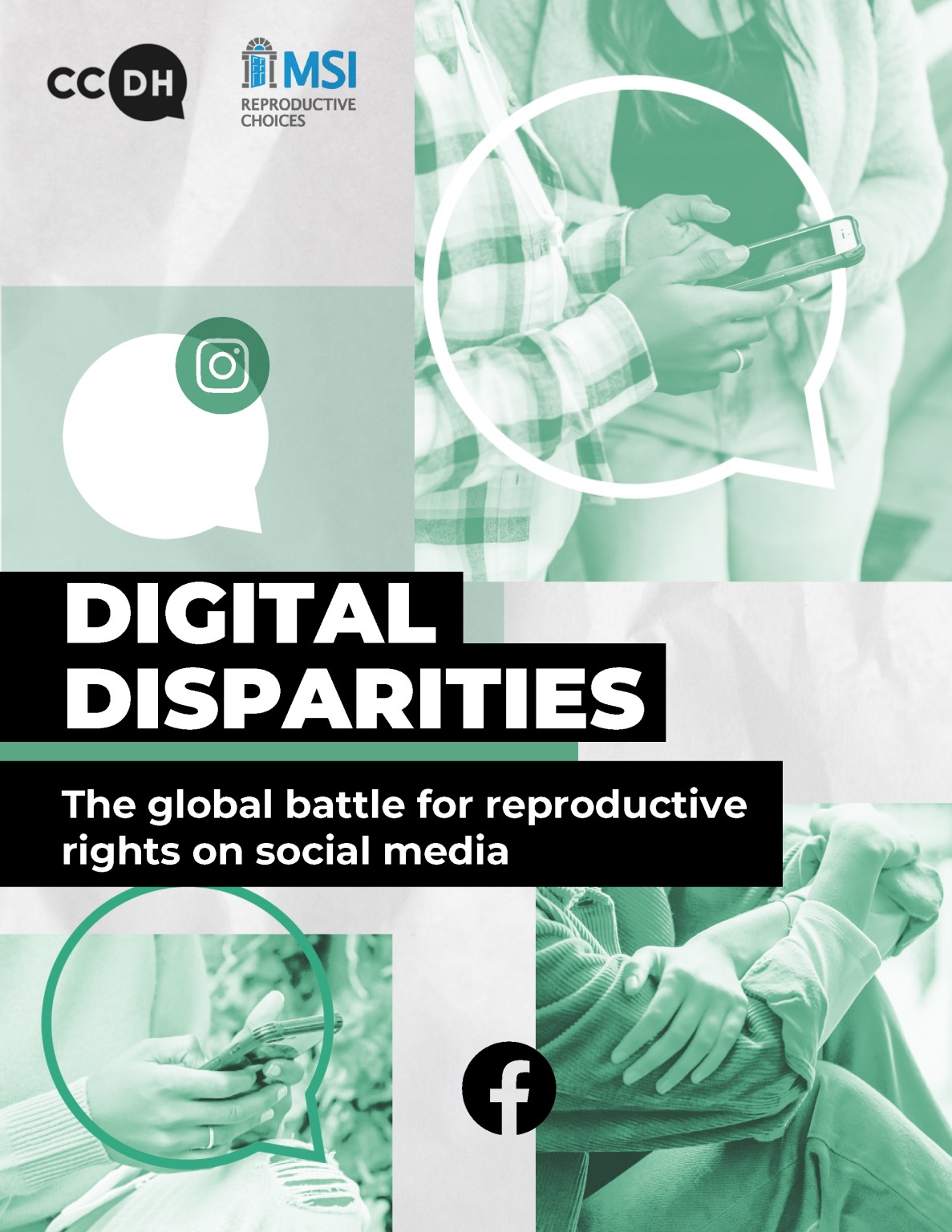Digital Disparities: The global battle for reproductive rights on social media
A new report released by the Centre for Countering Digital Hate (CCDH) and MSI Reproductive Choices has found that tech platform, Meta, is restricting information on reproductive care in Africa, Asia and Latin America, while allowing and promoting ads sharing anti-choice misinformation and conspiracy theories.
Researchers found that Meta and Google restrict local reproductive health providers in Africa, Asia, and Latin America from sharing accurate reproductive health and abortion information – while enabling and profiting from dangerous anti-abortion misinformation and abuse. Read the full report here.
Key findings:
- Platforms restrict access to accurate information about reproductive health services
- In Ghana, Kenya, Mexico, Nepal, Nigeria, and Vietnam, MSI ads have been rejected or removed by Meta for vague and unspecified reasons.
- Google severely restricted MSI ads in Ghana, even banning the term “pregnancy options” from being used when planning campaigns on the platform.
- Platforms fail to address anti-abortion misinformation and abuse directed at local reproductive health providers
- Meta approved paid ads by anti-abortion groups promoting conspiracy theories – including misleading claims that efforts to decriminalize abortion were financed by “global powers and international companies”, in order to “eliminate” local populations.
- Meta has profited from anti-abortion ads promoting false or misleading claims in Ghana and Mexico, seen up to 1 million times across both countries between 2019 and 2024.
- Ads placed by overseas anti-abortion groups in Ghana have been seen up to 3.83 million times globally
- Social media companies turn a blind eye to abuse and misinformation campaigns directed at local abortion service providers in these countries.
- In Kenya, local teams are increasingly targeted with abusive language on Facebook and X.
An intro by CCDH CEO, Imran Ahmed.
By privatizing and monetizing the sphere of public discourse – the means by which we find, share, and discuss information and opinions – social media companies and search engines take on a moral responsibility to ensure that they administer those spaces effectively and in a way that encourages a healthy discourse. Platforms have three main means by which they do this. First, they have a choice who uses their platform, whether that is to post or to advertise. Second, they have a choice on how they enforce their rules on disinformation, whether that is clear, transparent, and effective, or – as it is at the moment – confusing, opaque, and clearly ineffective. Third, they use algorithms to privilege certain speech with amplification and downgrade other speech.
Because of the ubiquity of their services, companies such as Meta and Google reshape our information environment on sexual and reproductive health and rights (SRHR) around the world. CCDH has partnered with MSI Reproductive Choices, a global leader in reproductive healthcare and advocacy, to investigate the real-world impact of platform behavior in 8 countries where MSI operates.
Our meetings with local healthcare providers and research into the user experience in those locations found platforms obstruct content promoting accurate abortion information by using opaque explanations to reject content, paid advertisements, or imposing blanket bans on accounts. Meanwhile, we found that these companies have failed to address abuse and misinformation targeted at healthcare providers in stark contrast to the experience of MSI Reproductive Choices, whose ads are often banned. We found Meta running anti-abortion ads in many countries peddling disinformation and conspiracy theories that received millions of views. Some of the disinformation ads were placed by foreign groups working outside of the countries they were targeting.
Healthcare providers like MSI Reproductive Choices – and countless others worldwide – are unable to provide people with necessary advice and care because social media platforms act as gatekeepers, deciding whether and how they can reach people online. The suppression of reliable health information undermines users’ fundamental rights to accurate medical information about their sexual and reproductive health.
Search engines and platforms like Meta and Google claim to have ‘global’ advertising policies and community standards, which they apply at their own discretion with little oversight. The inconsistent application of these policies can seriously damage the ability of providers to reach people – and must be urgently fixed.
In this report, CCDH and MSI come together to show how reproductive health content is blocked, while anti-choice misinformation is given license to thrive. Platforms must proactively address abuse, misinformation, and partner with providers globally to ensure accurate information is unrestricted. We need mandatory transparency about advertising for health-related content, not just social and political categories that platforms often box abortion within.
In the United States, the legal immunity conferred upon social media companies by Section 230 of the Communications Decency Act 1996, a law meant to protect burgeoning Internet content providers 28 years ago – sometimes described as a “Good Samaritan” law encouraging companies to clean up the spaces they administer – has morphed from protection from legal action, to a dereliction of their duty to predict and mitigate harms. Meanwhile, having seen the impotence of our legislators, courts, and regulators, many people and decision makers have resigned themselves to the notion that inaction and indifference is the norm, and have failed to demand any degree of transparency, accountability or responsibility from these companies.
Platforms, which for too long have been negligent in their promises to users about championing reproductive health, must be held accountable for their failures to respect users’ fundamental rights to good information. Critical information about reproductive health and abortion should not be censored – the impact on women’s health is too costly to ignore.
Meta, stop blocking access to accurate reproductive healthcare information
Everyone deserves access to accurate information on their reproductive health and rights – but around the world, access to this information is being restricted. Take action by signing this petition now.
